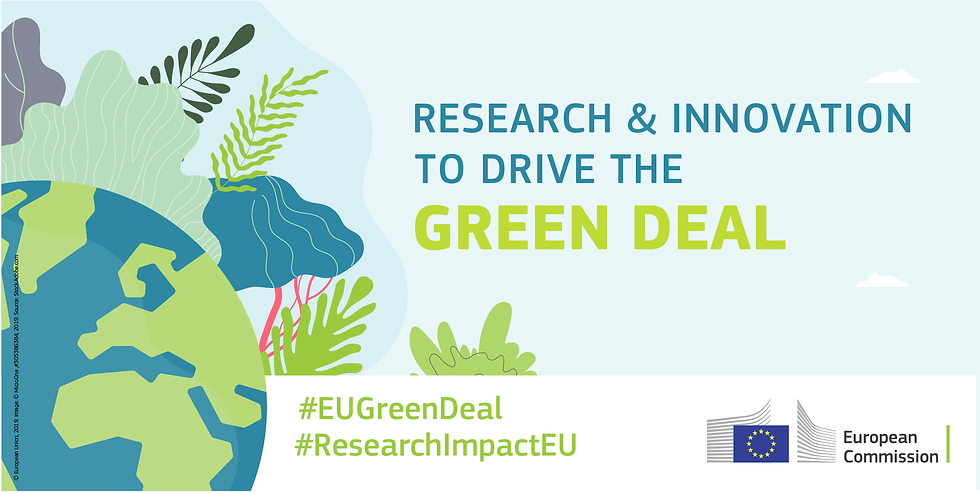Competition Law, the Environment, and the Drive for Sustainability
- Rory Horgan

- Mar 17, 2021
- 5 min read
Sustainability and the Changing Role of Corporations

The past decade has borne witness to a drastic evolution in how companies approach business. The days of a narrow shareholder-focused approach to corporate governance have been largely diminished, replaced by a new focus on employee participation and wider societal interests. This stakeholder-friendly approach has, in turn, produced its fair share of opportunities for growth and diversification, opened new markets and promoted consumer trust. Moreover, it has placed an onus on companies to reassess their business models and redefine how they create value, taking ESG risks and considerations into account.
With the European Commission now prioritising sustainability, commentators and market participants alike have raised questions over the adequacy of the current competition regime to handle ‘sustainable’ collaboration agreements between competitors. There exists an interesting disconnect here: the Commission continues to proactively pursue its sustainability goals (reflected by the European Green Deal and new Sustainable Finance Directive) yet has only recently turned its attention to addressing the issues surrounding the manner in which competition law has been applied in sustainability cases.
Why Must Environmental Factors be Considered?
Numerous arguments have been convincingly advanced on this front, however, for the purposes of this article, I will refine myself to one. Quite simply, environmental issues should be considered in the development and administration of competition policy because the constitutional treaties demand it. The environmental integration provision of Article 11 TFEU, explicitly requires the integration of environmental policy in the activities and policies of the Union. There is no exception provided for this provision, and competition authorities would be remiss to believe they are the anomaly.
Article 101 TFEU
As one of the bases for EU competition law, agreements between competitors are analysed under Article 101 of the Treaty on the Functioning of the European Union, while Article 101(1) TFEU prohibits agreements that restrict competition. Article 101(3) TFEU provides a mechanism for the weighing of anti-competitive effects of an agreement, with other valid benefits (efficiencies) which may outweigh any restrictive effects.
In 2014, ACM, the Dutch competition authority issued a set of “Directions” concerning the application of the Dutch equivalent of Article 101(3) TFEU in respect to sustainability initiatives. Under this approach, it was considered a wide interpretation of ‘consumer welfare be adopted’, which many commentators have considered to imply the encompassment of environmental effects. Unfortunately, the ECJ has followed no such approach in its own case law, as will be further discussed below.
There are also certain situations already where proportionate restrictions in a sustainability agreement may fall outside article 101(1), where the restriction is both inherent and integral to its conclusion. This was the approach followed in Albany, a case concerning collective bargaining agreements, and could be extended to sustainability agreements.
A second possible approach appears in the form of the Wouters case law, which provides that restrictions that can be justified by way of public policy may also fall beyond the remit of 101(1). This line again suggests that there is plenty of 'wiggle room' for sustainability concerns.
How Has the EU Dealt with Previous Case law?

Unfortunately, the Commission has dealt with cases through the narrow lenses of short-term consumer price increases. In the context of sustainability, the often-cited example of this comes in the form of the 2011 Unilever case. Here, competitors Procter & Gamble (P&G) and Unilever had voluntarily sought to reduce their environmental impact by minimizing the size of their packaging and material used, whilst reducing energy consumption with cold-water concentrated detergent.
Concerned consumers may not immediately understand the benefits of the new product and fearful of ‘first mover disadvantage’ (referring to how one party will often shoulder the cost of introducing new products, leaving the door ajar to competitors to sweep in to ride on the coattails the ‘first mover’), the parties co-ordinated on pricing and market launches.
Despite lower energy consumption and reduced waste representing wins for the environment and wider societal goals (including those of the European Union on sustainability), P&G and Unilever found themselves on the wrong side of article 101. What is striking is that by attempting to mitigate, rather than exploit, the effects of the new products on the market, the parties found themselves hit with a €315.2 million fine.
The case raises two interesting questions. First, does this type of judicial reasoning have a chilling effect on companies in the development and introduction of new sustainable products? Second, is this focus on consumer-price increase really in keeping with modern sensibilities?
‘Consumer Welfare’
The ultimate goal of competition policy is a debate that is unlikely to be settled having spawned endless volumes of literature. It is nonetheless important for our purposes to consider whether the competition authorities have traveled too far down the ‘Chicago school’ route of neo-liberalism.
The ‘neo-liberal’ approach mentioned concerns a sole focus on financial considerations and short-term price effects when analysing the effect of an agreement on ‘consumer welfare’. Given the popularity courts have afforded this approach in settling competition matters, it is surprising that there is no basis for the adoption of a narrow “consumer welfare” test anywhere in the treaties.
There is a core of good sense in the argument that consumer welfare, in the narrow sense of consumer surplus, should only exist alongside a more expansive set of aims focusing on both the competitive process and the integral goals of the TFEU – entailing both environmental and sustainability objectives.
Which Changes are Needed?
Refreshingly, Holmes has offered some interesting ideas which are both convincing and conceivable. He suggests modernising the 2010 Horizontal Guidelines by introducing a chapter on climate change, sustainability and the environment in a bid to foster collaborative action in these spheres and reduce the chilling effect of the uncertainty of the current approach.
Moreover, he advocates for further guidance from the Commission with regards to potential environmental remedies which may negate the potential anti-competitive effects of a merger and be taken into account by competition authorities reviewing these transactions.
Should this proves insufficient to stimulate much needed collaborative action going forward, a new block exemption for a defined category of sustainability agreements, alongside the addition of a reference to the environment, sustainability and climate change as a “legitimate interest” in Article 21(4) of the EU Merger Regulation (EUMR) are advanced.
Finally, as a last resort, Holmes suggests amending the treaties themselves to incorporate express references to climate change.
So, What’s the Verdict?

While competition policy may have its drawbacks, it should not be forgotten that effective competition can help stimulate innovation and provide more energy-efficient technologies at their lowest cost. Such competitive pressure is a powerful incentive to use our planet’s scarce resources efficiently, and it complements environmental and climate policies and regulations aimed at internalising environmental costs.
Nonetheless, if we are to be successful in the fight against climate change, collaboration may well have further-reaching benefits, allowing for the pooling of resources and removing barriers. In this regard, it is important that competition policy be part of the solution rather than part of the problem. As we have seen, changes are needed, however with the Commission now beginning to focus on these issues, one can imagine greener days ahead.

Rory is a Law BCL graduate from University College Cork in Ireland. He is currently pursuing his master's degree in International Business Law at the University of Brussels (ULB). Rory has held internship roles with a startup as an IP intern, a global legal network as a business analyst, and a national law firm in Ireland. With a particular interest in competition law and policy, Rory also holds a keen interest in environmental matters. He is also a keen showjumper in his spare time.




Comments